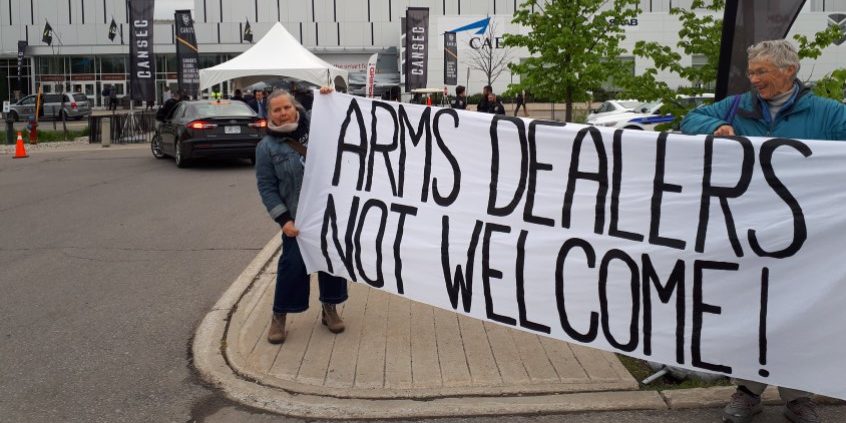World Beyond War and its allies are organizing a protest on Wednesday, June 1 to oppose the CANSEC trade show which is coming to Ottawa on June 1-2. Canada’s largest arms industry trade show, CANSEC is organized by the Canadian Association of Defence and Security Industries (CADSI).
“The presenters and exhibitors list doubles as a Rolodex of the world’s worst corporate criminals. All of the companies and individuals who profit most from war and bloodshed will be there,” reads a statement from World Beyond War.
The protest will take place at the EY Centre in Ottawa starting at 7 a.m. on June 1.
CADSI represents Canadian defence and security companies that together generate $10 billion in annual revenues, roughly 60 per cent of which come from exports.
Do these companies profit from war?
We can begin to answer that by looking at Lockheed Martin, the world’s largest defence contractor and one of the sponsors of this year’s CANSEC arms show.
Just prior to the Russian invasion of Ukraine, Lockheed Martin Chief Executive Officer James Taiclet said on an earnings call that the “renewed great power competition” would lead to inflated defence budgets and additional sales.
Investors appear to agree with him.
Currently, a share in Lockheed Martin is worth about USD $435.17. The day before the Russian invasion it was USD $389.17.
It’s a view also seemingly shared by Raytheon, another CANSEC sponsor.
Their CEO Greg Hayes told investors earlier this year that the company expected to see “opportunities for international sales” amid the Russian threat. He added: “I fully expect we’re going to see some benefit from it.”
If they do profit from war, by how much?
The short answer is a lot.
William Hartung, a senior research fellow at the New York City-based Quincy Institute for Responsible Statecraft, has commented: “There’s a lot of possibilities for ways that the contractors will benefit [from the war in Ukraine], and in the short term we could be talking about tens of billions of dollars, which is no small thing, even for these big companies.”
Companies profit not only from war, but from the precarious armed “peace” that precedes war. They make money from the status quo that relies on ever increasing armaments, rather than negotiation and genuine peace-building.
In 2021, Lockheed Martin recorded a net income (profit) of USD $6.32 billion from USD $67.04 billion in revenue that year.
That gave Lockheed Martin roughly a 9 per cent profit on its revenue.
If that same 9 per cent profit on annual revenue ratio were to be applied to the companies CADSI represents, that calculation would suggest they make about $900 million in annual profits, of which about $540 million come from exports.
If stock prices and international sales go up at a time of tension and conflict, does that suggest war is good for business?
Or conversely, that peace is bad for the arms industry?
Chillingly, CODEPINK co-founder Medea Benjamin has argued: “The weapons companies [are] concerned about the drawing down of U.S. wars in Afghanistan and in Iraq. [The state] sees this as an opportunity to really debilitate Russia.… The ability to bleed the Russian economy and to curtail its reach also means that the U.S. is strengthening its position globally.”
More hopefully perhaps, Arundhati Roy has previously commented that the corporate power commodifying and diminishing our lives will collapse if we don’t buy what they are selling, including “their wars, their weapons”.
For weeks, activists have been planning a protest against CANSEC.
Perhaps inspired by Roy, organizers reject war and the weapons of the companies that will be in Ottawa on June 1-2.
What transpires when these two worlds – those who seek profit and those who seek genuine peace – meet at the EY Centre remains to be seen.
For more about the protest against the CANSEC arms show on Wednesday June 1 starting at 7 am, please see this World Beyond War webpage.



